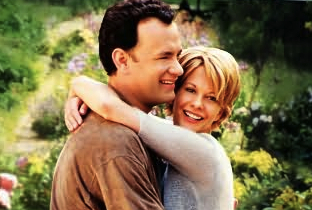Watching “You’ve Got Mail” in the Amazon Age

As the kind of writer who keeps his finger squarely on the cultural pulse, I’ve just watched the Tom Hanks/Meg Ryan romantic comedy “You’ve Got Mail” for the first time and would like to share some reactions.
To summarize for those who are further behind the times than I am: Nora Ephron’s screenplay pairs Joe Fox (Hanks) and Kathleen Kelly (Ryan) as two halves of an anonymous online relationship. Unhappy with their real-world romantic partners, they chat (and all but cheat) via email and instant messages. By day, Fox runs Fox Books, a Barnes & Noble-like superstore against which Kelly, an independent bookshop owner, is struggling to compete. The two meet in person as Upper West Side neighbors and business rivals, then complain about each other, to each other, online. Fox soon figures out his correspondent’s true identity, but keeps his own a secret for reasons that make less and less sense—and make Kelly look dimmer and dimmer—as the film goes on.
The chemistry is lukewarm and the presence of Dave Chappelle, in a “buddy” role, sadly squandered. But as one of the few major Hollywood films ever to depict the bookselling business, this pure ‘90s artifact now makes for fascinating viewing.
It’s actually remarkable how little the movie is about the Internet, and how much it’s about books. It’s almost a Trojan horse in this regard; Ephron deserves credit for smuggling a plot about the oldest of old media into a screenplay that ostensibly concerns the new.
And yet for all its separate commentaries on the changing book trade and the burgeoning Web, “You’ve Got Mail” fails charmingly to predict the dovetailing of the two trends. On the broadest level its concerns are still very much with us; in the specifics, though, it’s as nearsighted as an aging bookworm. We watch Ryan falling for Hanks, blissfully unaware that he’s putting her out of business—and Hanks falling for Ryan, blissfully unaware that both of their business models are jeopardized by the very technology that brings them together! Even the screenwriter hasn’t planned this final twist. (Someone who did see it coming? Amazon CEO Jeff Bezos, Time’s Person of the Year the following winter.)
Thus hindsight adds a bittersweet layer of dramatic irony to a plot already thick with it, and we view each scene through a doubly nostalgic lens. I ended up sympathizing less with the main characters than with Ephron, whose love letter to indie bookstores is all but blinded by passion. She tries to be fair: by movie’s end she quietly concedes some of the appeal of chain megastores. (Occasionally I muster the same grudging respect for Amazon.) And I take it that Frank, the typewriter aficionado played by Greg Kinnear, is her gentle send-up of her own tendencies toward cultural regressivism. But if she’d foreseen the decline of physical bookstores themselves—something I still have trouble facing—it might have broken her heart. Now as in 1998, so many of us who love book culture can read everything but the writing on the wall.
Two last, brief observations. First: the scene in which Meg Ryan has to close her little shop brought more of a lump to my throat than the final kiss.
Second: the film turned Cafe Lalo, where one of its key scenes takes place, into an Upper West Side landmark sought out by tourists to this day. I dearly wish it had done the same with at least one real-life New York City bookstore.
[Image via Barnes & Noble.]





